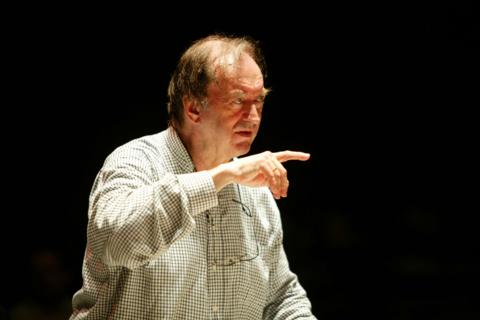|
<< -- 4 -- Rex Harley DAY OF JUDGMENT

It took only a few bars of the overture to discover the answer. When the trumpets entered, their ascending phrase was ritardando to a degree, allowing a gradual and more dramatic crescendo too. What Harnoncourt was 'improving' was the sense of drama. When Thomas Mohr, as Unbelief, began his recitatative, it was with a sneering arrogance befitting his role. Where Harnoncourt was taking us was essentially into the world of opera. My only concern was that character might become caricature, and drama melodrama.

Nikolaus Harnoncourt. Photo © Harry Schiffer
|
After a while, when we had heard the other soloists -- alto Elizabeth von Magnus as Reason, tenor Herbert Lippert as the Mocker, and soprano Genia Kühmeier as Religion -- I no longer cared. Even if this was melodrama, it worked, and it did so because Harnoncourt had balanced everything to perfection. Not only were the soloists perfectly matched, in the timbre of their voices and in their commitment to performance in character; the choir too sang collectively in character, and the orchestra attacked the music in a way that emphasised the emotional extremes inherent in the text. And all with a combination of precision and passion which swept me off my feet, as if I were once again hearing the piece for the first time.
When Unbelief sang, with heavy irony, Zittert im Staube; wir steigen empor! ('Tremble in the dust: we rise up!'), the strings punctuated the word Staube with furious, almost violent spiccato playing. Suddenly, it sounded as if we were in the middle of a Dies Irae, and the irony of the soloist was turned on its head. We knew, as certainly as the chorus, that before the end of the piece he would indeed be trembling in the dust! As for Reason's riposte, when mountains 'shake and fall, crashing down to the deepest depths' and the earth itself cracks -- sie kracht -- the onomatopoeia sounded quite terrifying. This aria has a kind of desperate intensity about it; the feel of a final warning which, if heeded, might yet avert disaster. In fact it reminded me, both in mood and also melodically, of Storge's aria, 'Scenes of horror, scenes of woe', in Handel's Jephtha. The two composers were friends, so a small homage would not have been out of the question.
Continue >>
Copyright © 18 July 2004
Rex Harley, Cardiff UK

|

